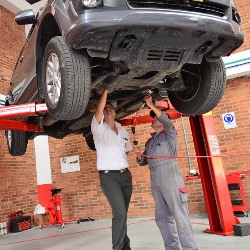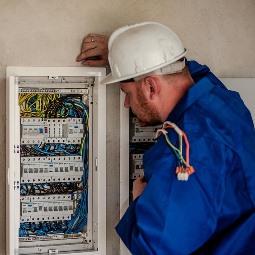How to Choose the Right Vocational School Training near Deepwater Missouri
 Choosing to begin a new profession and enroll in a trade school near Deepwater MO are serious decisions that will greatly influence your long term career. But with numerous trade schools to select from, exactly how do you go about identifying the ideal one? Not only do you need to make certain that you will get the comprehensive training required to succeed in your new profession, but also that the school is highly regarded and reputable. Many students make the error of enrolling in a vocational school simply because the campus is closest to their home or where the work. Or they might gravitate to the school that has the most affordable tuition. Naturally the cost and location of the training are critical considerations when analyzing trade school options, but they must not be the only ones. Additional considerations including accreditation and the reputation of the schools are critical as well. So before you begin evaluating and comparing trade schools, you must know what questions you should be asking so you can get the information to make a final choice. We will address several of those questions later in this post. But first, let’s talk about a few of the trade options that are available as well as the accessibility of online schools.
Choosing to begin a new profession and enroll in a trade school near Deepwater MO are serious decisions that will greatly influence your long term career. But with numerous trade schools to select from, exactly how do you go about identifying the ideal one? Not only do you need to make certain that you will get the comprehensive training required to succeed in your new profession, but also that the school is highly regarded and reputable. Many students make the error of enrolling in a vocational school simply because the campus is closest to their home or where the work. Or they might gravitate to the school that has the most affordable tuition. Naturally the cost and location of the training are critical considerations when analyzing trade school options, but they must not be the only ones. Additional considerations including accreditation and the reputation of the schools are critical as well. So before you begin evaluating and comparing trade schools, you must know what questions you should be asking so you can get the information to make a final choice. We will address several of those questions later in this post. But first, let’s talk about a few of the trade options that are available as well as the accessibility of online schools.
Vocational School Training Options near Deepwater MO
 There are an abundance of trades to pick from in vocational schools that offer fulfilling and high paying careers. Perhaps you have already chosen one that you have long wished to pursue. For instance, perhaps you have always taken pleasure in working on your car and have thought about using that skill to make a living as an auto mechanic. Or maybe a family member has had a prosperous career in a specific trade or vocation and you would like to follow in her or his footsteps. No matter what your motivation is for entering a trade, there is probably a program available that will provide the training that you need. Below is just a small representation of the trade school programs that are offered in the Deepwater MO area.
There are an abundance of trades to pick from in vocational schools that offer fulfilling and high paying careers. Perhaps you have already chosen one that you have long wished to pursue. For instance, perhaps you have always taken pleasure in working on your car and have thought about using that skill to make a living as an auto mechanic. Or maybe a family member has had a prosperous career in a specific trade or vocation and you would like to follow in her or his footsteps. No matter what your motivation is for entering a trade, there is probably a program available that will provide the training that you need. Below is just a small representation of the trade school programs that are offered in the Deepwater MO area.
- Auto Mechanic
- Heating And Air Conditioning (HVAC) Tech
- Plumber
- Electrical Technician
- Welding
- Truck Driving
- Aircraft Maintenance Tech
- Lab Tech
- Construction Manager
Each of the programs will have varying costs and completion times based upon the trade, type of credential and school. Some of the programs may be completed in just weeks, while others will necessitate several months or even 2 or more years of instruction. Each of these elements must be taken into account before selecting a vocation and school.
Click Here to Get Free Information on Trade Schools Near You!
Learning a Vocation Online
 Trade Schools online have become more attractive with Deepwater MO students and more and more accredited programs are becoming available. While online learning is a very convenient and accessible way to acquire a degree or certificate, it may not be the ideal option for all trades or vocations. For instance, learning to operate a tractor trailer is not something that you can do online, nor is training how to weld. These are skills that have to be acquired through practical training and by doing it, not by reading about it or watching videos. But certain aspects of the training can be suitable for online training, for example learning driving and safety guidelines for truck driving schools or learning about metallurgy or how to read blueprints for welder schools. Some programs will incorporate online education with on-campus practical training, such as for HVAC or plumbing schools. So it is essential to find out before enrolling in an online program for any vocation if there is an appropriate amount of hands-on training devoted to the syllabus. One means to help ensure that a vocational school program is both suitable for online learning and provides in-depth hands-on training is to confirm that it’s accredited by a nationally recognized accrediting agency (more on accreditation later). For those vocations that are suitable for online training, it can be a practical way for individuals with limited time to acquire a new profession.
Trade Schools online have become more attractive with Deepwater MO students and more and more accredited programs are becoming available. While online learning is a very convenient and accessible way to acquire a degree or certificate, it may not be the ideal option for all trades or vocations. For instance, learning to operate a tractor trailer is not something that you can do online, nor is training how to weld. These are skills that have to be acquired through practical training and by doing it, not by reading about it or watching videos. But certain aspects of the training can be suitable for online training, for example learning driving and safety guidelines for truck driving schools or learning about metallurgy or how to read blueprints for welder schools. Some programs will incorporate online education with on-campus practical training, such as for HVAC or plumbing schools. So it is essential to find out before enrolling in an online program for any vocation if there is an appropriate amount of hands-on training devoted to the syllabus. One means to help ensure that a vocational school program is both suitable for online learning and provides in-depth hands-on training is to confirm that it’s accredited by a nationally recognized accrediting agency (more on accreditation later). For those vocations that are suitable for online training, it can be a practical way for individuals with limited time to acquire a new profession.
Concerns to Ask Trade Schools
 As soon as you have selected the vocation and type of degree or certificate that you want to acquire, either online or on campus, you can begin to limit your selection of schools. As you are probably aware, there are a large number of technical schools in the Deepwater MO area and across the United States to select from. That’s why it is extremely important to have a checklist of key qualifiers when making school comparisons. As previously mentioned in our opening paragraph, tuition and location will most likely be the first 2 factors you will take into consideration. Following are several additional ones that you will want to explore before enrolling in your school of choice.
As soon as you have selected the vocation and type of degree or certificate that you want to acquire, either online or on campus, you can begin to limit your selection of schools. As you are probably aware, there are a large number of technical schools in the Deepwater MO area and across the United States to select from. That’s why it is extremely important to have a checklist of key qualifiers when making school comparisons. As previously mentioned in our opening paragraph, tuition and location will most likely be the first 2 factors you will take into consideration. Following are several additional ones that you will want to explore before enrolling in your school of choice.
Accreditation. Numerous Deepwater MO area technical schools have received either a regional or a national accreditation. They can attain Institutional Accreditation, which involves the school’s programs as a whole, or Programmatic Accreditation, which relates to an individual program, such as HVAC technology. Make sure that the program and school are accredited by a U.S. Department of Education acknowledged accrediting organization, for instance the Accreditation Board for Engineering and Technology. In addition to helping make certain that you acquire a quality education, it can help in acquiring financial aid or student loans, which are frequently not available for non-accredited schools. Additionally, some states require that the training program be accredited for it to qualify for licensing where applicable.
How Long in Operation? One indicator to help measure the quality of a vocational school near Deepwater MO is how long it has been in operation. A negatively reviewed or a fly by night school typically will not be in business very long, so longevity is a big plus. However, even the best of schools had to begin from their first day of training, so use it as one of several qualifications.
Completion Rates. Ask the tech schools you are reviewing what their completion rates are. The completion rate is the percentage of students who enroll in and complete the course. A lower completion rate could signify that students were dissatisfied with the program and dropped out. It could also suggest that the instructors were not competent to instruct the students. It’s similarly imperative that the schools have higher job placement rates. Older and/or more reputable schools may have a broader directory of graduates, which may produce more contacts for the school to utilize for their apprenticeship and job placement programs. A high job placement rate can not only validate that the school has an excellent reputation within the trade, but additionally that it has the network of contacts to help students secure apprenticeships or employment in the Deepwater MO area.
Apprenticeship Programs. Numerous vocational programs are taught together with an apprenticeship or an internship program. Those participating technical and vocational schools will help place you in an apprenticeship program within their network of companies or trade unions. Find out if the schools you are comparing have referring relationships with Deepwater MO area professionals in the trade. An apprenticeship not only offers a rewarding experience by furnishing hands-on training, but it also supplies job opportunities and helps to establish relationships in the area professional community.
Modern Facilities. Make sure that the campus facilities and the equipment that you will be trained on are up-to-date and what you will be working with in the field. If you are presently in an internship or an apprenticeship, talk to the tech you are working under concerning what you should be expecting. If not, ask a local Deepwater MO contractor if they can provide some suggestions. Additionally keep in mind that unless you are willing to relocate, the school needs to be within driving distance of your residence. Remember that if you decide to attend an out-of-state school, in addition to relocation costs there may be higher tuition fees compared to in-state residents.
Smaller Classes. It’s desirable that you get as much personalized training as possible, which can be challenging in bigger classes. Ask if you can sit in on a few of the classes so that you can see how big they are and witness first hand the interaction between students and instructors. Talk with a few of the students and get their opinions regarding class sizes and instruction. Last, talk to a few of the instructors and learn what their level of experience is in Missouri and what degrees or certifications they hold.
Flexible Scheduling. Verify that the class schedules for the programs you are reviewing are flexible enough to fulfill your needs. If you can only go to classes in the evening or on weekends near Deepwater MO, verify that the programs you are comparing offer those choices. If you can only attend on a part-time basis, make certain that the school you select permits part-time enrollment. Finally, find out what the policy is to make-up classes should you miss any due to work, sickness or family responsibilities.
Trade Certificate Deepwater Missouri
 Enrolling in the ideal trade school near Deepwater MO is an important beginning toward a rewarding career in the vocation of your choice. As we have addressed in this post, you need to pick a trade school and a degree or certificate program that are both accredited and have outstanding reputations within the profession. Other factors to search for are lots of hands-on training and modern facilities. You need to check out each of the schools in person that you are most interested in to tour the campus and speak with both the current students and faculty. Try to get a feel for the quality of the teaching and the interaction between them. In addition, ask about scheduling choices and whether or not evening or weekend classes are available if needed. And remember to ask about financial aid and student loan options as well. You initially came to this website because of your interest in Trade Certificate and wanting more information on the topic Going To Trade School. However, if you ask the proper questions as we have detailed in our checklist for evaluating schools, you’ll be able to narrow down your options so that you can make an educated decision. With the right training, hard work and dedication, you can eventually become a licensed professional in your chosen trade.
Enrolling in the ideal trade school near Deepwater MO is an important beginning toward a rewarding career in the vocation of your choice. As we have addressed in this post, you need to pick a trade school and a degree or certificate program that are both accredited and have outstanding reputations within the profession. Other factors to search for are lots of hands-on training and modern facilities. You need to check out each of the schools in person that you are most interested in to tour the campus and speak with both the current students and faculty. Try to get a feel for the quality of the teaching and the interaction between them. In addition, ask about scheduling choices and whether or not evening or weekend classes are available if needed. And remember to ask about financial aid and student loan options as well. You initially came to this website because of your interest in Trade Certificate and wanting more information on the topic Going To Trade School. However, if you ask the proper questions as we have detailed in our checklist for evaluating schools, you’ll be able to narrow down your options so that you can make an educated decision. With the right training, hard work and dedication, you can eventually become a licensed professional in your chosen trade.
Other Missouri Hard Working Locations
Deepwater, Missouri
Deepwater is located at 38°15′37″N 93°46′31″W / 38.26028°N 93.77528°W / 38.26028; -93.77528Coordinates: 38°15′37″N 93°46′31″W / 38.26028°N 93.77528°W / 38.26028; -93.77528.[8]
As of the census[2] of 2010, there were 433 people, 188 households, and 125 families residing in the city. The population density was 509.4 inhabitants per square mile (196.7/km2). There were 240 housing units at an average density of 282.4 per square mile (109.0/km2). The racial makeup of the city was 98.8% White, 0.5% Native American, and 0.7% from two or more races. Hispanic or Latino of any race were 1.6% of the population.
There were 188 households of which 25.0% had children under the age of 18 living with them, 42.0% were married couples living together, 17.6% had a female householder with no husband present, 6.9% had a male householder with no wife present, and 33.5% were non-families. 25.0% of all households were made up of individuals and 11.7% had someone living alone who was 65 years of age or older. The average household size was 2.30 and the average family size was 2.70.
